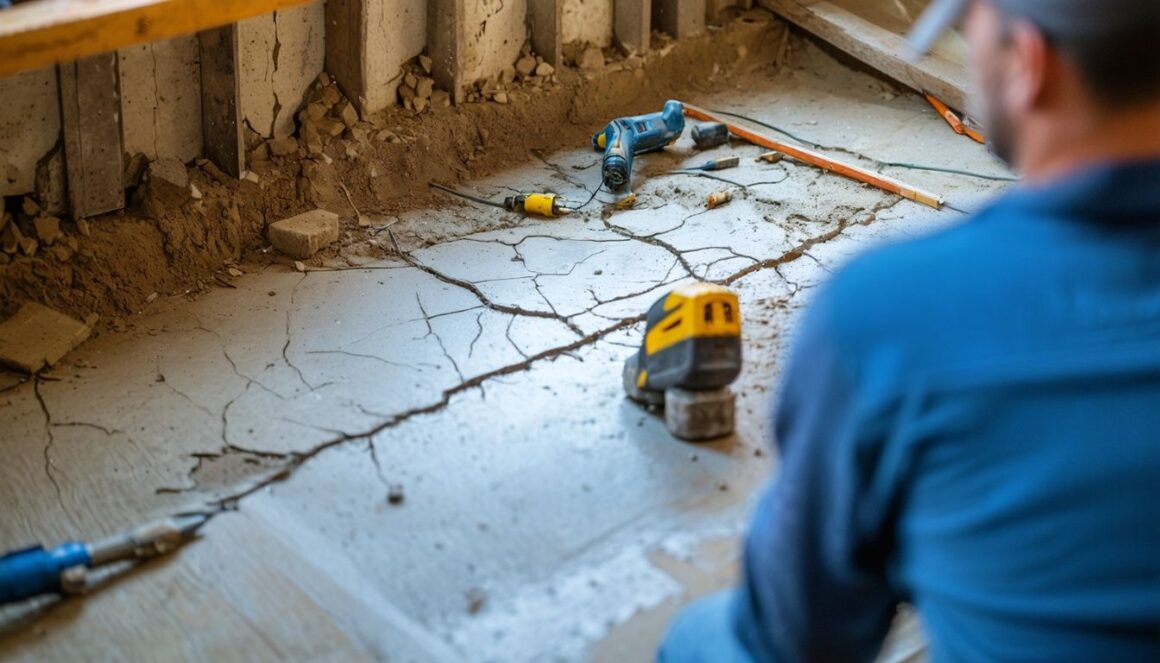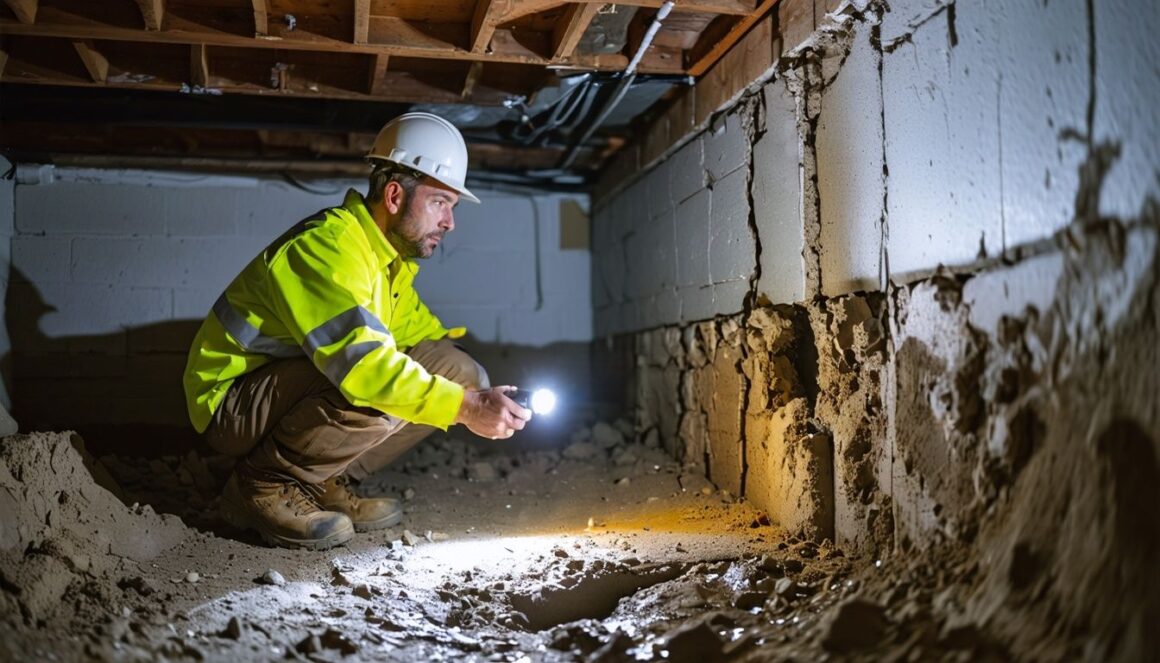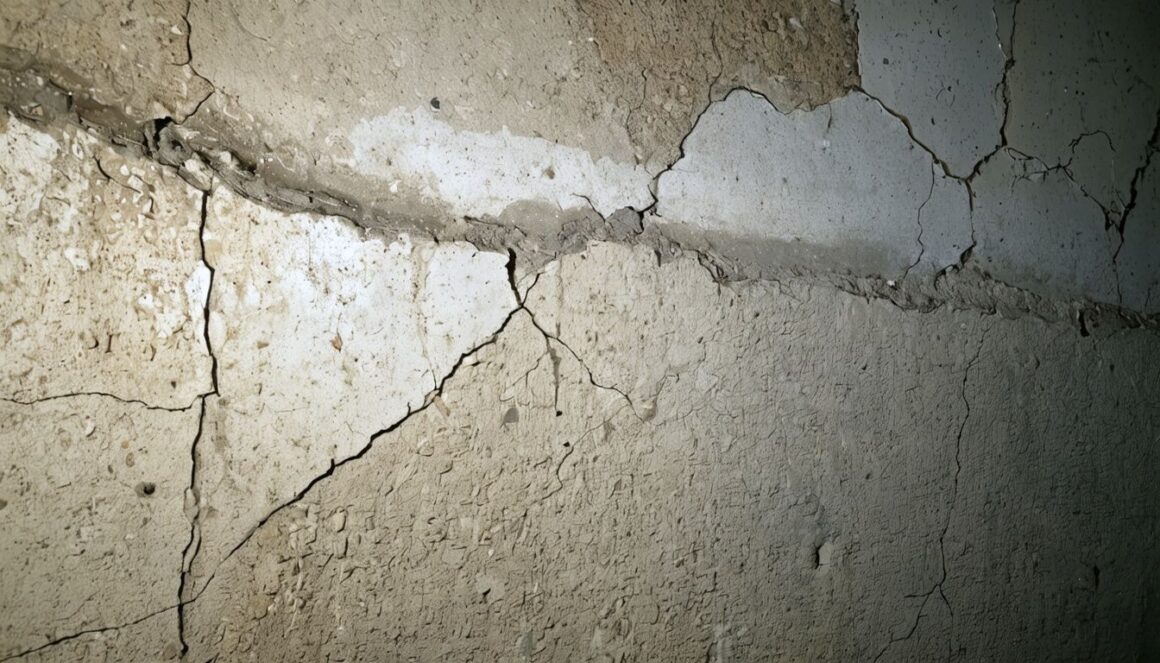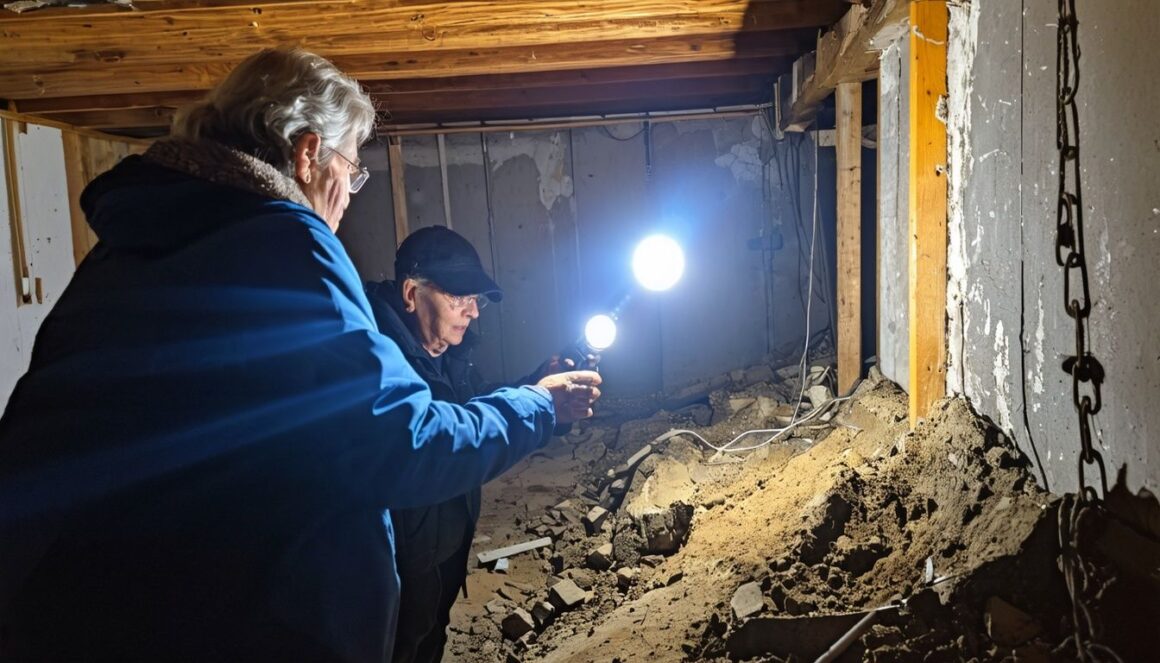Home foundation problems can cost homeowners thousands of dollars in repairs. A typical home foundation inspection costs between $300 and $800. This guide will help you understand when to get an inspection and what to expect during the process.
Ready to protect your biggest investment?
Key Takeaways
- Foundation inspections typically cost $300-$800 and can save homeowners thousands in repairs by catching problems early.
- Key signs of foundation issues include cracked tiles, wall cracks wider than 1/8 inch, bowing walls, sticking doors/windows, and sloping floors.
- Professional inspections last about 2 hours and involve examining the exterior, interior, basement/crawl space, and surrounding soil conditions.
- DIY checks can help with basic maintenance, but professional inspectors have specialized tools and expertise to catch subtle problems.
- Regular foundation inspections are crucial before buying or selling a home and should be done annually or after major storms for manufactured homes.
Understanding Foundation Inspections
Foundation inspections are vital checks of a home’s base. They reveal hidden issues and help prevent costly repairs.
Definition and Significance
Home foundation inspections are crucial evaluations of a property’s structural integrity. They assess the base that supports your entire house, looking for signs of damage or potential issues.
These checks, typically done by structural engineers, differ from standard home inspections in their depth and specificity.
The significance of foundation inspections can’t be overstated. They help catch problems early, potentially saving homeowners thousands in repair costs. For buyers, these inspections provide peace of mind about a major investment.
For sellers, they offer a chance to address issues before listing, potentially increasing property value and appeal.
Key Benefits and Reasons
Foundation inspections offer critical insights into a home’s structural health. They provide homeowners and buyers with valuable information to make informed decisions.
- Identify potential dangers: Professional inspections can reveal hidden risks in older homes, preventing accidents and costly repairs.
- Save money long-term: Regular checks help catch small issues before they become major problems, avoiding expensive fixes down the road.
- Speed up home sales: A recent inspection report can reassure buyers and simplify the selling process, potentially leading to faster closings.
- Comprehensive assessment: Inspectors examine the entire foundation, including visual checks, soil analysis, and detailed reporting.
- Peace of mind: Knowing your home’s foundation is sound allows you to rest easy about your property’s stability and value.
- Customized repair plans: If issues are found, inspectors can recommend targeted fixes, ensuring efficient and effective solutions.
- Increased property value: A well-maintained foundation can boost your home’s worth and appeal to future buyers.
- Insurance benefits: Some insurers offer lower premiums for homes with recent foundation inspections, recognizing the reduced risk.
- Early warning system: Regular inspections can alert you to developing problems before they cause visible damage to your home.
- Expert advice: Professional inspectors provide skilled insights that DIY checks might miss, ensuring thorough evaluations.
Optimal Timing for Foundation Inspections
Foundation inspections are crucial before buying or selling a home. Regular checks help catch problems early, saving money and preventing major issues down the line.
Pre-Sale Considerations
For homeowners planning to sell, a foundation inspection is a smart move. It helps identify any issues before listing, allowing time for repairs and potentially boosting the sale price.
A clean bill of health for the foundation can be a strong selling point, giving buyers confidence in the property’s structural integrity.
Inspections typically cost between $350 and $775, including a detailed report. This investment can pay off by preventing surprises during buyer inspections and negotiations. It also allows sellers to address any problems proactively, avoiding last-minute deal breakers or price reductions.
Pre-Purchase Evaluations
Pre-purchase foundation inspections are key for home buyers. They reveal hidden issues that could cost big bucks down the road. A pro inspector checks for cracks, settling, and structural problems.
They also look at drainage around the house – poor water flow can damage foundations over time.
These checks help buyers make informed decisions. If issues pop up, buyers can negotiate repairs or price adjustments. For manufactured homes, lenders often require a permanent foundation inspection.
This ensures the home meets loan standards and local building codes.
Identifying Visible Issues
Foundation problems often show visible signs before they become severe. A keen eye can spot these indicators during a walk-around of your property.
- Cracked tiles: Uneven floors can cause tiles to crack or separate. Look for patterns of cracked tiles, especially near walls or in the center of rooms.
- Wall cracks: Hairline cracks are common, but wider cracks or those that run diagonally could signal foundation issues. Pay attention to cracks wider than 1/8 inch or those that grow over time.
- Bowing walls: Walls that curve inward or outward may indicate pressure from soil or water damage. Check both interior and exterior walls for any noticeable bulging or leaning.
- Gaps around windows or doors: Shifting foundations can cause frames to separate from walls. Look for spaces where light shines through or where drafts enter.
- Sticking doors or windows: If doors or windows become difficult to open or close, it could be due to frame warping from foundation movement.
- Sloping floors: Use a level or roll a marble across the floor to check for unevenness. Floors that aren’t level may indicate foundation settling.
- Moisture issues: Water damage, mold, or musty odors in basements or crawl spaces can point to foundation problems allowing water intrusion.
- Exterior cracks: Inspect the visible parts of your foundation for cracks, especially those wider than 1/4 inch or with horizontal patterns.
- Chimney tilt: A leaning chimney can be a clear sign of foundation issues, as it often separates from the house structure.
- Porch separation: If your porch columns appears to be pulling away from the main structure, it could indicate foundation movement.
Special Cases for Manufactured Homes
Manufactured homes require special attention during foundation inspections. These structures must meet HUD standards to ensure safety and stability. A thorough check can prevent costly repairs down the line.
Inspectors look for proper anchoring, levelness, and signs of moisture damage.
Professional evaluations are crucial for manufactured homes. They assess the tie-downs, piers, and overall structural integrity. Regular inspections help maintain the home’s value and protect against severe weather impacts.
Homeowners should schedule these checks annually or after major storms.
Foundation Inspection Procedures
Foundation inspections involve a thorough check of your home’s base. A pro will look at key areas and note any issues. Want to know more about what happens during an inspection?
Expected Duration and Steps in Home Foundation Inspection
Foundation inspections typically last around two hours. A professional examiner follows a systematic approach to assess the structure’s integrity.
-
- Walk around the home’s exterior
- Check for cracks, bulges, or unevenness in walls
- Inspect doors and windows for proper alignment
- Look for signs of water damage or moisture issues Visual examination (30-45 minutes):
-
- Examine floors for levelness
- Check walls for cracks or separation from ceilings
- Inspect basement or crawl space for moisture problems
- Look for gaps between walls and floorsInterior assessment (30-45 minutes):
-
- Use specialized tools to measure foundation settlement
- Take photos of any concerning areas
- Document findings in detailMeasurement and documentation (15-30 minutes):
-
- Assess soil conditions around the foundation
- Check drainage systems and grading
- Identify potential external factors affecting the foundationSite evaluation (15-30 minutes):
-
- Provide initial findings to the homeowner
- Answer questions about observed issues
- Discuss next steps if problems are foundBrief analysis and discussion (15-20 minutes):
-
- Compile detailed findings into a written report
- Include photos and measurements
- Offer recommendations for repairs or further evaluation
- Deliver report to client within a few daysReport preparation (post-inspection):
Critical Inspection Elements
Professional foundation inspections involve a thorough examination of key structural components. These critical elements provide insights into the overall health and stability of a home’s foundation:
- Exterior Walls: Check for bowing, bulging, or leaning. Look for cracks wider than 1/10 inch.
- Interior Walls: Examine for cracks, especially those extending from floor to ceiling.
- Doors and Windows: Test for proper alignment and ease of operation.
- Floors: Assess for unevenness, sloping, or sagging areas.
- Basement: Inspect for water damage, mold, or musty odors.
- Crawl Spaces: Look for signs of moisture, insect damage, or structural issues.
- Drainage Systems: Evaluate gutters, downspouts, and grading for proper water flow away from the foundation.
- Soil Conditions: Analyze soil type and moisture content around the foundation.
- Support Structures: Examine load-bearing walls, beams, and posts for signs of stress or failure.
- Foundation Footings: Check for erosion, settling, or exposure above ground level.
Identifying Signs of Foundation Problems
Foundation problems can sneak up on you. Look for cracks in walls, sticking doors, or uneven floors. These signs might mean trouble brewing beneath your home.
Self-Assessment Techniques for Foundations
Regular foundation checks are crucial for maintaining your home’s structural integrity. Here are some self-assessment techniques you can use to inspect your foundation:
- Walk the perimeter: Check for visible cracks, bulges, or tilting in the exterior walls.
- Examine doors and windows: Look for gaps or sticking – these may indicate foundation shifts.
- Check interior walls: Look for cracks, especially around door frames and windows.
- Inspect floors: Note any sloping or uneven areas in your home’s flooring.
- Monitor basement or crawl space: Look for water damage, mold, or musty smells.
- Assess grading: Ensure the ground slopes away from your house to prevent water pooling.
- Look for gaps: Check for separation between walls and ceilings or floors.
- Document changes: Take photos and notes regularly to track any progressive issues.
- Test drainage: During rainfall, observe how water flows around your home.
- Check for pest activity: Look for signs of termites or other wood-destroying insects.
- Measure cracks: Use a ruler to track if existing cracks are growing over time.
- Assess exterior trim: Look for separations between trim and the house.
Indicators of Foundation Concerns
Foundation issues can manifest in various ways throughout a home. Here are key indicators that may signal foundation problems:
- Door and window troubles: Doors or windows that stick, won’t close properly, or have gaps around the frames.
- Cracked tiles: Unexplained cracks in floor tiles, especially in areas far from high-traffic zones.
- Wall cracks: Visible cracks in interior or exterior walls, particularly those that are wider at the top or bottom.
- Bowing walls: Walls that appear to curve inward or outward, often noticeable in basements.
- Excessive humidity: Unusually high moisture levels in basements or crawl spaces.
- Water presence: Puddles, dampness, or water stains in basements or around the foundation’s perimeter.
- Pest infestations: Increased bug activity, especially in lower levels of the home.
- Chimney issues: A chimney that leans or separates from the house structure.
- Exterior fractures: Cracks in the visible parts of the foundation or in exterior brick or stonework.
- Wood decay: Rotting wood in floor joists, support posts, or other structural elements.
- Protruding drywall nails: Nails that pop out from walls or ceilings, often due to shifting.
- Uneven floors: Floors that slope, dip, or feel bouncy when walked on.
- Gaps between walls and ceilings: Visible spaces where walls meet ceilings or floors.
Professional Foundation Inspection Guidelines
Professional foundation inspections offer expert insights into your home’s structural integrity. Curious about what these pros look for? Read on to learn more.
Essential Questions for Foundation Inspectors
Foundation inspectors play a crucial role in assessing your home’s structural integrity. Here are key questions to ask before hiring one:
- Cost and inclusions: “What’s the total cost of the inspection, and what does it cover?” Prices typically range from $300 to $800, with complex inspections reaching $3,000.
- Report details: “What information will be in the final report?” Ask about specific elements they’ll examine and document.
- Foundation types: “What types of foundations are you experienced in inspecting?” Ensure they’re familiar with your home’s specific foundation.
- Homeowner presence: “Do I need to be present during the inspection?” Some inspectors prefer the owner to be available for questions.
- Access requirements: “What areas of my home do you need access to?” This helps you prepare for the inspection day.
- Document review: “Will you need to see any previous inspection reports or repair records?”
- Timeline: “How long will the inspection take, and when can I expect the report?” Knowing this helps plan your schedule.
- Repair recommendations: “Do you provide a list of trusted foundation repair contractors?”
- Credentials: “Are you licensed and insured?” This protects you and ensures professional standards.
- Permit knowledge: “Can you advise on local permit requirements for foundation repairs?”
- Engineering expertise: “Do you work with structural engineers for complex issues?”
- Follow-up support: “Will you be available for questions after I receive the report?
Conclusion
Home foundation inspections are crucial for homeowners. They catch problems early, saving money and headaches. Regular checks protect your investment and ensure safety. Don’t wait for visible issues – schedule an inspection today.
Your home’s stability depends on a solid foundation.
FAQs
1. Why do I need a home foundation inspection?
You need a home foundation inspection to spot signs of foundation problems early. It’s crucial when buying, selling, or maintaining a house. Foundation damage can lead to costly repairs if ignored.
2. How long does a foundation inspection take?
A thorough foundation inspection usually takes 2-3 hours. The process includes checking the exterior and interior of your home. Inspectors look for cracks, settling, and other issues with the foundation.
3. What do foundation inspectors look for?
Foundation inspectors examine the perimeter of your home, foundation walls, and slab foundation. They check for cracks, uneven floors, and gaps around windows or doors. The inspection identifies potential foundation damage or maintenance needs.
4. When should I consider a foundation inspection?
Consider a foundation inspection when buying a home, noticing cracks in walls or floors, or before major home improvements. It’s also wise to get one if you’re selling a home or see signs of foundation problems.
5. How much does a foundation inspection cost?
The cost of a foundation inspection varies, typically ranging from $300 to $1000. Factors affecting price include home size, location, and inspection depth. It’s a small investment compared to potential repair costs.
6. What questions should I ask my foundation inspector?
Ask your foundation inspector about their qualifications, the inspection process, and what they’ll examine. Inquire about common issues in your area, maintenance tips, and how to interpret their findings. Their answers help you understand your home’s foundation health.

Jonathan Fleck, a seasoned 40-year-old writer and editor, boasts an impressive 12-year career specializing in the dynamic realms of Home and Garden. As the Chief Editor of Home and Around Blog, Jonathan is at the forefront of curating content that resonates with enthusiasts and novices alike. His vast knowledge encompasses a range of topics, including houseplants, small space gardening, home DIY, small space living, and crafting.
Jonathan’s academic journey includes a graduation with a degree in the History of Art from Long Island University (LIU) in New York City, New York, United States. This educational background, coupled with his passion for creative expression, has shaped his unique approach to writing about the aesthetics and functionality of living spaces.
With a keen eye for detail and a wealth of experience, Jonathan has become a trusted voice in the Home and Garden community. His articles not only provide practical advice but also inspire readers to transform their living environments into personalized havens. Whether it’s cultivating a thriving indoor garden, optimizing small living spaces, or embarking on creative DIY projects, Jonathan Fleck’s expertise shines through, making him a respected authority in the field.




